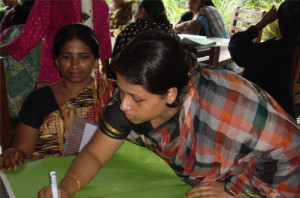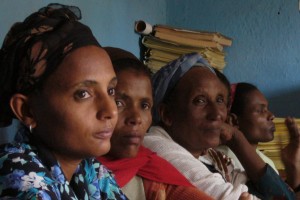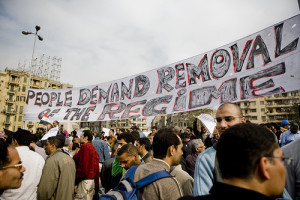Understanding Democratic Governance and Market Economy
 There is an ongoing debate in academic circles and among practitioners on the linkages between democratic governance and market economies. It has intensified in light of transitions taking place after the fall of the Berlin Wall. Amidst expectations that all societies would move swiftly toward liberal democracy and market economy, we’ve seen a variety of outcomes. In many cases, countries’ progress in building sound democracies and functional market economies has been hampered by the lack of understanding of their key principles.
There is an ongoing debate in academic circles and among practitioners on the linkages between democratic governance and market economies. It has intensified in light of transitions taking place after the fall of the Berlin Wall. Amidst expectations that all societies would move swiftly toward liberal democracy and market economy, we’ve seen a variety of outcomes. In many cases, countries’ progress in building sound democracies and functional market economies has been hampered by the lack of understanding of their key principles.
New Institutional Economics and Political Economy
 New Institutional Economics (NIE), as defined by ISNIE, the International Society for New Institutional Economics, is an interdisciplinary enterprise combining economics, law, organization theory, political science, sociology and anthropology. Although NIE borrows liberally from various disciplines, its primary language is economics. Its goal is to explain what institutions are, how they arise, what purposes they serve, how they change and how they can be reformed.
New Institutional Economics (NIE), as defined by ISNIE, the International Society for New Institutional Economics, is an interdisciplinary enterprise combining economics, law, organization theory, political science, sociology and anthropology. Although NIE borrows liberally from various disciplines, its primary language is economics. Its goal is to explain what institutions are, how they arise, what purposes they serve, how they change and how they can be reformed.
Civil Society, Free Media, and Advocacy
 In many countries – even those that hold democratic elections – the daily policymaking process remains closed and does not involve input from the public. Consequently, laws and regulations are often made above the heads of those to whom they pertain. Public policy advocacy can address this democratic deficit by making civil society voices heard in an open and transparent manner. Successful advocacy efforts do not just ameliorate immediate problems: they help transform the relationship between the government and civil society from one of antagonism and distrust to one of partnership and cooperation.
In many countries – even those that hold democratic elections – the daily policymaking process remains closed and does not involve input from the public. Consequently, laws and regulations are often made above the heads of those to whom they pertain. Public policy advocacy can address this democratic deficit by making civil society voices heard in an open and transparent manner. Successful advocacy efforts do not just ameliorate immediate problems: they help transform the relationship between the government and civil society from one of antagonism and distrust to one of partnership and cooperation.
Entrepreneurship and Development

A commonly encountered notion is that entrepreneurship and innovative thinking pertain only to successful businessmen and are of little relevance to average citizens. But in reality entrepreneurship and innovation are universal traits rather than privileges of a narrow group. After all, entrepreneurship present in spot market transactions and street bazaars is a fabric of daily life in most developing countries. Yet, many of those countries cannot be described as prosperous. What is missing in that informal kind of entrepreneurship?

Corruption is the starkest result of poor governance and one of the leading reasons for the ongoing political and economic failures of many developing countries. The need for an increased emphasis on fighting corruption is more evident today than ever before, as globally estimated $1 trillion is paid in bribes each year.
The Importance of Corporate Governance
 Corporate governance is a set of rules that define the relationship between stakeholders, management, and board of directors of a company and influence how that company is operating. At its most basic level, corporate governance deals with issues that result from the separation of ownership and control. But corporate governance goes beyond simply establishing a clear relationship between shareholders and managers.
Corporate governance is a set of rules that define the relationship between stakeholders, management, and board of directors of a company and influence how that company is operating. At its most basic level, corporate governance deals with issues that result from the separation of ownership and control. But corporate governance goes beyond simply establishing a clear relationship between shareholders and managers.
Corporate Citizenship, Compliance, and Business Ethics
Corporate citizenship, also referred to as corporate social responsibility, is increasingly instrumental in defining the role of business in society. As the issue of integrating broader economic, environmental, and social concerns into evaluating corporate performance gains prominence, proper understanding of what it means for a company to be a good citizen becomes crucial.
Corporate citizenship is a contribution a company makes to society and the…
 Women comprise half of the world’s population, perform 66 percent of the world’s work, produce 50 percent of the food, and constitute between 60 and 80 percent of the manufacturing workforce in developing countries. In addition, women business owners make up the majority of entrepreneurs in the informal sector and a large share of the micro-enterprise sector. Yet, despite their extraordinary contributions to socio-economic development, women continue to be marginalized in many countries around the world. When women are fully engaged in the development process on a fair and equal level, economic and social gains can grow at an exponential level.
Women comprise half of the world’s population, perform 66 percent of the world’s work, produce 50 percent of the food, and constitute between 60 and 80 percent of the manufacturing workforce in developing countries. In addition, women business owners make up the majority of entrepreneurs in the informal sector and a large share of the micro-enterprise sector. Yet, despite their extraordinary contributions to socio-economic development, women continue to be marginalized in many countries around the world. When women are fully engaged in the development process on a fair and equal level, economic and social gains can grow at an exponential level.
Lessons Learned from Transitions
 The collapse of communism in the former Soviet bloc, and more recently the Arab Spring, created a unique and unprecedented momentum for political and economic reform. While the overall policy prescription offered by the Western countries and international organizations was unanimous – democratize and introduce free markets – the details of how those broad guidelines were implemented varied. So did the outcomes.
The collapse of communism in the former Soviet bloc, and more recently the Arab Spring, created a unique and unprecedented momentum for political and economic reform. While the overall policy prescription offered by the Western countries and international organizations was unanimous – democratize and introduce free markets – the details of how those broad guidelines were implemented varied. So did the outcomes.
Today’s Debates in International Development
 The field of international development remains diverse, with many different voices from around the world contributing to the debate. While all the parties participating in the discussion share the same goal of improving the well-being of people in developing countries, policy prescriptions they advocate can vary greatly. One reason for that diversity is the difference in emphasis on root causes of weak democratic and market development, and how they are to be addressed.
The field of international development remains diverse, with many different voices from around the world contributing to the debate. While all the parties participating in the discussion share the same goal of improving the well-being of people in developing countries, policy prescriptions they advocate can vary greatly. One reason for that diversity is the difference in emphasis on root causes of weak democratic and market development, and how they are to be addressed.

Recent Comments